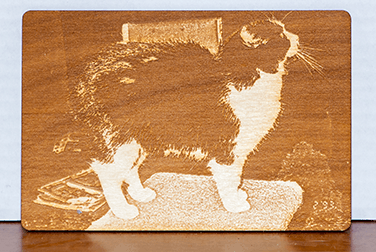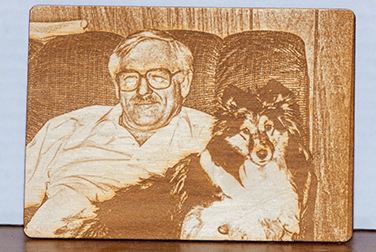
For more information, visit LaserEtchingArt.
Welcome to Blarney Manx cats
After over 30 years, we are no longer showing and breeding manx.
Please use our site as a resource for buying and caring for manx, information about manx syndrom, and how to pick out respectable breeders.

For more information, visit LaserEtchingArt.
Commandments For Manx Kitten Buyers
- Don't hurry. Take your time. If getting a Manx, any Manx, right now, is your goal, then you could be sorry, and you will get what you ask for: just any Manx!
- Read more than one book. Do not base your whole understanding on generic descriptions.
- Talk to Manx breeders about temperament and personality.
- Contact the national breed club. Basic information on the breed is free, A local club representative can handle specific questions.
- Ask for names of club members you may talk to and learn from.
- Plan on attending cat shows that have Manx entered
- Be honest when you contact breeders about what you are looking for and your past experience with Manx cats.
- If you are not ready to bring a Manx into your home, have changed your mind, are still searching or have purchased a Manx from someone else, contact the breeder to have your name removed from the waiting list.
Reputable Breeders that We Recommend
Lovingly raised under foot
Blarney Shelties
Puppies Occasionally Available.
Please Contact Them for More Information.
The Manx Syndrome Myth: The Myths & The Truth
by Richard Cullen & Sherman Ross, BS Eng.Phy., MS Ed, President, American Manx Club.
Technical Consultant: Karen Commings for Manx Cats: Complete Pet Owners Manual, (Barons, 1999) & Joanne Mattern for The Manx Cat, (Capstone Press, 2002)
Manx Syndrome is a subject of great concern to all lovers of the Manx breed. It is fraught with emotion, steeped in misinformation, and perpetuated by the ignorant. Perhaps some light can be shed on this subject by comparing some of the myths of Manx Syndrome to the actual truth.
Myth
Truth
Manx Syndrome is any of several birth defects related to the Manx gene and afflicting the Manx breed.
There is no common definition of what Manx Syndrome is. All of the conditions commonly called Manx Syndrome occur in other breeds of cat and other species of animals. Therefore these conditions cannot be linked to the Manx gene.
Manx have shorter backs than other cats because they have fewer vertebrae. This leads to severe neurological problems.
The Manx gene does not impact the spine above the pelvis. The gene causes the cat to have fewer caudal vertebrae causing a shorter tail. Manx have the same number of vertebrae in the upper spine as any other cat.
Spina Bifida is a Manx condition.
Spina Bifida is a condition found in all animal species that have spines. It is caused by the neural tube that forms the spine not closing completely in the fetus. It is not related to the Manx gene. It has been shown to be a combination of genetic and environmental factors. In humans the environmental trigger is insufficient folic acid during pregnancy. The environmental factor in cats is not known. Some Veterinarians have bred Manx with Spina Bifida in their genes and related it as a Manx Syndrome. This is really bad science. But unfortunately, since it was published in a Veterinary Journal, many vets believe this.
Urinary and fecal incontinence is a part of Manx Syndrome. It is due to insufficient nerve endings.
Incontinence occurs in all breeds of cats; it is not related to the Manx gene. There is no diagnostic for missing nerves except extremely careful and complete autopsy. Incontinence is related to spina bifida.
The homozygous rumpy is an automatic lethal, and is never born.
The Manx gene for taillessness is a variable-expression gene. This type of gene is also called an incomplete dominant. The gene is always present, but always variable. It acts very much like the white spotting or bicolor gene. Homozygous rumpy is in fact a meaningless term.
It is necessary to use tailed Manx in the breeding to prevent Manx Syndrome.
This is demonstrably untrue. A good MANX breeder can point to sound healthy Manx without tails in the pedigree for six generations. A much more important consideration is the length of the upper spine. Breeding excessively for shorter bodies causes the individual vertebrae in the upper spine to be shorter. Bred to the extreme, this causes problems in any breed.
You have found someone that raises Manx, & now you need to know:
Is This Breeder Reputable?
How do you know if the breeder you have contacted is a person of integrity committed to bettering the Manx breed?
Following are a few guidelines to help you make that determination.
A Reputable Breeder:
- Requires that pet-quality animals be spayed or neutered before they go to their new homes. Be very wary of breeders who do not mention altering.
- Requires a contract, these can vary, but spells out the rights of both the seller and buyer, health information, altering and buy-back/return policy.
- Shows a great interest in, love for and knowledge about the breed. He or she cares about placing their kittens in good homes and will interview potential buyers thoroughly, ask for references and refuse to sell a kitten if necessary. Be wary of a breeder that is eager to get rid of their kittens.
- Is actively involved in the cat fancy, including showing or breed clubs. A person who is not involved with others in the breed can be suspect.
- Guarantees a kitten's general health for a certain period of time. While no one can guarantee against inheritable diseases, a reputable breeder is well-informed about genetic problems in their breed and bloodlines, routinely has cats/kittens tested for problems and passes this information along to buyers. Beware of breeders who scoff at genetic testing and say their particular breed/line is problem-free.
- Is willing to provide answers to questions you may have and is willing to provide names of others who have their Manx.
- Will allow you to meet the kitten's parents if available and, if the father isn't available, be willing to show pictures.
- Follows up on placements. He or she is interested in how the Manx develop physically and mentally, difficulties in the owner/cat relationship and health problems.
- Rarely has more than four (4) litters a year.
- Never
- Sells to a Pet Shop
- Sells at Flea Markets
- Offers Manx For Auction
The environment, (raised "underfoot" in the home) in which the Manx are kept should be clean and well-maintained: Trust your insticts on this!
How To Select A Reputable Breeder
A large number of the kittens raised in the U.S. are raised by people who NEVER have another litter. Relatively few of these people are well informed, prepared for the experience and do a good job. They don't usually stand behind their kittens. Very few are equipped to take adequate care of all their kittens until they can be placed in good homes, regardless of how long that takes. Another LARGE PERCENTAGE of kittens are raised by "Kitten mills" that sell numerous litters of many breeds, or sell to retailers for resale.
A responsible breeder never sells to pet shops
That leaves relatively small percentages of kittens being raised by experienced people who are dedicated to one or two breeds and raising kittens for reasons other than maximum profit. Not all of these breeders are knowledgeable and conscientious.
How Do You Identify An Experienced and Conscientious Breeder?
- When you inquire about a Manx, the breeder will interview you. You know they will not sell you a Manx kitten simply because you want one and have the money to pay for one. They want to know that you can house and raise their Manx appropriately and that their kitten will have one "For Ever Home".
- You will talk to and buy the Manx from the breeder who raised the litter and owns or co-owns the mother. Conscientious breeders don't trust other people to screen new homes for them and would NEVER offer a Manx as a prize or for an auction. Their Manx kittens don't cost any more because there is no "middleman". All kittens will have had all of their Vaccinations.
- The breeder will know the ancestry of the kittens, not just Parents, but Grandparents, Great Grand Parents, etc. Not just titled and colors, but strong points and weak points of personality and structure.
- The breeder will tell you what genetic screening is necessary for the Manx, and will be willing to discuss problems.
- You won't see multiple litters of multiple breeds. One to three breeds is typical and one to five litters a year TOTAL is typical. You will see evidence (photos, books, awards) of long term interest and activity in the Manx breed. The kittens environment will be clean with ample room for exercise, and socializing.
- The kittens will not have been separated from their mother and littermates at less than 14 weeks of age. Many breeders consider 14 weeks ideal, some wait until the Manx kitten is 16 weeks or older.
- All things discussed and implied will be written down in a contract. The breeder will be there to help and advise you throughout the life of your Manx. The breeders will ask you to bring the kitten (or cat) back to them at any age, if for any reason you can't keep him.
- Unless you are very serious about becoming a student of your breed and a conscientious breeder, and dedicated to showing to improve the Manx breed (or any other breed), the kitten will be spayed or neutered before going to his/her new home. The breeding of a Manx is a responsibility that shouldn't be entered into lightly.
- The breeder will insist that you prepare an appropriate place at home for your kitten before you take him/her home. They will give you thorough personal instructions on feeding, care and a record of vaccinations and worming.
- If CFA registration application will be sent home with the kitten.
Be aware that CFA registration does not mean quality, or health. It only means that your Manx is registered. "Pet quality" kitten should be considered as just that! Even litters from very well bred parents usually contain only a few "show or breeding" quality kittens. The rest of the litter sold as pets and the buyers realize that these kittens are not to be used for breeding
What In Fact Is A "Reputable Breeder"?
Because just about anyone can throw two cats together and produce kittens, I have outlined a few guidelines for choosing a reputable breeder.
A reputable breeder:
- Takes responsible care of all of his or her cats (breeding stock & kittens), and provides:
- Sufficient companionship, affection, interaction & attention
- Nutritious quality food & fresh clean water
- Adequate shelter
- Immunization
- Proper vet care
- Parasite prevention/treatment
- Grooming
- Exercise
- Socialization
- Belongs to a national (and/or local) breed club.
- Abides by their breed club's Code of Ethics.
- Tests their breeding stock for any congenital diseases, conditions and strives to eliminate genetic problems by breeding only sound cats (shown to be free of any serious physical conditions and/or temperament problems).
- Only breeds cats that have excellent temperaments.
- Is very knowledgeable about their breed.
- Strives to better their breed.
- Immunizes their kittens' Sires and Dams (& their Kittens) against: Rhino, Calici. Panaleukepenia, & Rabies.
- Screens potential owners thoroughly, and does not sell to those who are unsuitable.
- *Educates potential owners, and discloses any pertainent information about their breed
- Discloses info about (and abides by) "The CAT Lemon Law".
- Neuters and spays all kittens that are not of superb quality.
- Offers new kitten/cat owners guidance and support (for the kitten's entire lifetime).
- NEVER sells kittens to brokers, pet shops or animal outlets of any kind (including so-called "Kennel/Cattery Clubs"). Period.
- * Shows and titles their cats *
- Supports or participates in breed rescue work whenever possible.
- Never breeds out of greed (and never over-breeds).Will take back a kitten or cat that doesn't work out.
- * A reputable breeder wants to know as much about you, your household, your schedule and your ability to properly care for a kitten (throughout its entire lifetime), as you want to know about the breeder's kittens.
Important Note: Many pet stores and puppy outlets tell prospective buyers that their kittens come from reputable breeders, even though the large majority of these places actually get their kittens from kitten/puppy mills and second-rate commercial breeding facilities
The bottom line is: No reputable breeder will ever sell their kittens to a pet store or kitten/puppy outlet, and no pet store or kitten or puppy outlet will ever admit to getting their kittens from a kitten or puppy mill



